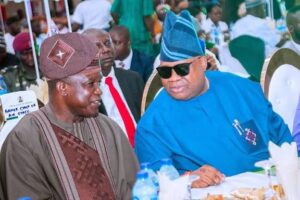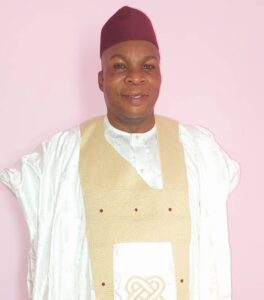![[OPINION] Aare Kunle Ajeigbe: Setting the Pace](https://newsbulletin.com.ng/wp-content/uploads/2025/08/1754252312868.jpg)
By Abdulfatai Tomori
One indisputable fact is that Olalemi Compound in the Afonta Area of Offa is one of the family compounds that have played an important role in shaping the history and growth of the town. For over a century, this compound has produced outstanding personalities who have driven socio-cultural and economic growth within and beyond the town.
Within this revered compound lies a particularly influential lineage, the Giwa and Ajeigbe family. Although Giwa and Ajeigbe may appear to represent separate family branches, they are so deeply connected that it is nearly impossible to mention one without referring to the other. At the heart of this shared legacy is Madam Asumowu Oladunni who distinguished herself as a successful trader and matriarch of the Ajeigbe family. She represented the very essence of Offa womanhood—industrious, spiritual, enterprising, and dignified. Her unwavering commitment to hard work and moral integrity remains a guiding influence in the upbringing of generations of her descendants.
Her father, Pa Olatunde, hailed from a proud and distinguished lineage. He was the son of Arafenwa, grandson of Ibitayo, great-grandson of Ibi’jeniorin, great-great-grandson of Bale Apekotoje, and great-great-great-great-grandson of Arolu, the first King of Ilemona. According to Ilemona’s historical account, Arolu is believed to have reigned between 1188 and 1255. By this lineage, Madam Asumowu was a princess of Ilemona. Aside from Madam Asumowu, Pa Olatunde had other children, including Oladipo, Olabisi, and Alhaji Sanni Olatunde Ilesanmi Giwa, MBE, among others. Alhaji Sanni Giwa was a respected business mogul, community leader, and devout Islamic scholar whose impact reached far beyond the pulpit.
Alhaji Sanni Giwa, along with others, promoted the growth of commerce, Islamic values, and community development in Ibololand, and played a significant role in numerous cultural and communal associations. He was the Baba Egbe of many social clubs. He also served as the Giwa of Egbe Ilesanmi (Giwa Ilesanmi), the leader of the Ilesanmi Social Club, an elite society of mainly affluent Muslims established around 1920. Though originally a title of leadership, Giwa Ilesanmi would eventually evolve into a respected family name in Offa. Through his unwavering commitment to Islamic scholarship in Ibololand, Alhaji Ilesanmi played a significant role in promoting the dissemination of the teachings of the Holy Qur’an and the customs (Sunnah) of the Prophet Muhammad (SAW). For many years, he served as the Alfa Mufassir of the Offa Central Mosque, earning deep admiration and reverence from all corners of the community.
Iya Ile Esunja, as Madam Asumowu was affectionately known, had a son named Lawani Okandeji Ajeigbe. The name “Ajeigbe,” which later became a surname, may have been derived from his role as Alaga Egbe Ajeigbe (Chairman of the Ajeigbe Social Club), a position he held and through which the name gained prominence. This is similar to how titles such as “Giwa Ilesanmi” evolved into surnames based on social or leadership roles. This club (Ajeigbe) would later evolve into the Ansarudeen Society of Nigeria, Offa Branch, with Alhaji Lawani Ajeigbe naturally becoming its first chairman. Alhaji Lawani Ajeigbe had four wives.
The third, Rabiat Ibilola Aweke Ajeigbe, gave birth to five children: Abdulrauf Adetunji, Mulikat Akanke Shittu, Sariyu Asake Olagoke, Abdullatif Adekunle Ajeigbe, and Rashidat Ajoke Iwalola. Each of them pursued different career paths. For instance, Alhaja Sariyu Asake Olagoke became a principal at Offa Community High School, where she eventually retired. Notably, she concluded her career at the same school where her husband, Alhaji Mashood Kajogbola Olagoke, had served as the founding principal when the school was established around 1980.
Meanwhile, Abdullatif Adekunle Ajeigbe built a distinguished career in finance and business. His journey led him beyond Nigeria’s borders, where he rose to the position of Managing Director and Chief Executive Officer of Union Bank of Cameroon before his retirement. Back home, he is recognised as one of Offa’s most accomplished entrepreneurs and strategic thinkers. My first encounter with Aare Ajeigbe was in 2021 during a research assignment commissioned by the late Alhaji Tajudeen B. S. Giwa. Our organisation, Biohistocultural Resources Hub, had been engaged to write a posthumous biography of Alhaji Sanni Olatunde Giwa, a politician and businessman of remarkable repute who passed away in 1970. The discovery of a familial connection between the Giwa and Ajeigbe families brought a new layer of significance to the work. I learnt that the late Alhaji Giwa was a sibling of Madam Asumowu, the paternal grandmother of Aare Ajeigbe. This genealogical revelation further emphasised the rich and storied heritage of the Ajeigbe family.
When I eventually reached out to Aare Ajeigbe, his warm reception was striking. He answered the call himself and spoke in a tone that revealed a man of humility and groundedness. Our meeting was scheduled at Awrab Suites, his magnificent hospitality venture which stands as one of the finest in Offa. During that visit, our discussions extended beyond the scope of the Giwa biography. We spoke about the traditions of Offa, the importance of entrepreneurship in community building, family histories, and the future roles that Offa youths must play in shaping society. He encouraged me to consult his sister, Alhaja Olagoke, to gain further insight into the family history.
Subsequent interactions revealed that his humility was not a façade but a reflection of deep-rooted character. Whether over the phone or via WhatsApp, his responses to requests were prompt, respectful, and thoughtfully delivered. For someone of his standing, he remained remarkably accessible and sincere. It is uncommon to find individuals of such calibre who still carry themselves with such ease and simplicity. But then again, who could fault him if he chose otherwise? A seasoned businessman understands that every call holds potential—any one of them might just lead to the next big opportunity.
A more recent meeting with him occurred at the behest of the Kwara Tabloid, an initiative of Tunde Bakare and Associates that comprises both online and print editions, the Kwara Tabloid podcast, and an image branding unit. The company also operates a printing press known as Trump Card. Through its multimedia platforms, the Tabloid proposed an interview to spotlight his groundbreaking new project, Scene City. Given the nature of the assignment, which required both audio and video production, I enlisted the support of one of the youngest and most promising bloggers making waves in Kwara State and beyond, the Chief Executive of Newsbuletin Nigeria, Taofik Adekunle Jimoh (JAAT), along with a member of his team. As expected, Aare Ajeigbe received us in grand style. After the interview session, he personally took us on a tour of the Scene City complex.
It was late Wednesday afternoon. The sun hung low as we stepped through the lively entrance of Scene City, a vibrant new urban complex buzzing with life. The air was filled with the hum of conversation, the pulse of music from the Sapphire Club, and the soft murmur of water from a central fountain. Around us was more than architecture; it was a vision realised by a man driven to reimagine what his hometown could become. Scene City had moved from dream to reality, meticulously brought to life by someone who seamlessly blended corporate insight with a deep sense of cultural duty. With quiet pride, Aare Ajeigbe guided us through the grounds. At Starlight Cinemas, families queued eagerly for evening shows, no longer needing to travel to Ilorin or Osogbo for a night out. Nearby, a restaurant served both local favourites and continental delicacies, while the gaming centre rang with laughter and cheers from young visitors.
Every corner of the complex reflected deliberate design and visionary purpose, a living testament to what passion and planning can achieve. Yet the road to completion had not been without difficulty. He recounted the financial pressures he encountered, including the sudden spike in cement prices, and how he discovered mismanagement by certain employees. The greatest disappointment, however, came from some of the young graduates he tried to mentor, many of whom he observed were ill-prepared for the workplace and viewed employment more as an entitlement than an opportunity. Nevertheless, he persevered. Four years of diligent effort and strategic planning have now created jobs for over a hundred locals, with a ripple effect of positive impact across Offa.
What stood out most strikingly was the profound sense of collective ownership and community-driven commitment that underpinned the entire project. The call for an “Offa Tuntun” (A New Offa), made by the Olofa of Offa, His Royal Highness Oba Mufutau Muhammad Gbadamosi Esuwoye II Ajagungbade I, was not treated as a ceremonial slogan but embraced as a genuine call to action. The monarch, often described as “Oba a so igbo di ile, a so igbe di igboro” (the king who turned the forest into a home and the bush into a town), symbolised the transformational intent behind the movement. In response, artisans, elders, youths, and even members of the royal household made meaningful contributions toward realising this shared vision.
As Aare Ajeigbe aptly remarked, “This is the Offa spirit. We do not wait. We build.” It is a spirit anchored in self-reliance, vision, and unity, offering a powerful model for community-led development.
When asked to describe Scene City in a single word, his answer came without hesitation: “Unmatched.” It wasn’t merely the cutting-edge amenities that made it stand out. What truly set it apart was the philosophy behind it—a deep, deliberate commitment to both place and people. In street parlance, when someone does things exceptionally, people say “gbe fun” or “mo gbe fun.” And truly, mo gbe fun Aare Ajeigbe, oko Yeye meji – Yeye Aare and Otun Yeye Aare! His developmental strides and job creation efforts explain why accolades continue to follow him.
It’s no surprise that he has received several chieftaincy titles in recognition of his lasting contributions to cultural preservation and community advancement. Kabiyesi Olojoku first honoured him with the title of Otunba Bobajiiro of Ojokuland, followed by the prestigious title of Aare Bobaselu of Offa Kingdom. He was later conferred with the title of Aare Gbobaniyi of Koko by Onikoyi Onikoko.
In Aare Kunle Ajeigbe, Offa sees more than a man of means. It sees a man of mission and momentum. His story continues to unfold, and his legacy continues to grow. In every initiative he undertakes, whether civic, entrepreneurial, or philanthropic, he is writing a new chapter not just for himself but for generations to come.
His story is still unfolding. His legacy is in motion. Every decision, every project, and every act of generosity contributes to a growing narrative defined by service, resilience, and foresight. Aare Kunle Ajeigbe today stands not just as a symbol of personal achievement, but as a bridge-builder—linking generations, connecting past with future, and translating vision into tangible progress. The momentum he has created is no coincidence. It is the result of strategic planning, unwavering discipline, and a deeply rooted sense of responsibility. As Offa moves forward, the presence of individuals like Aare Ajeigbe offers not only hope but a living blueprint for sustainable and community-led transformation. Did I mention he has a charity foundation? Yes, he does. It is called the Abdul-Latif Adekunle Ajeigbe Foundation. Curious to know more about him? Just wait for his memoir. When? Very soon.
For Aare Ajeigbe, pace isn’t just speed. It is direction. And others follow his lead.
Abdulfatai is a researcher, writer, and editor.



![[OPINION] Hon Omituntun: Redefining Grassroots Leadership In Offa By Abdulrahman Bashir Kehinde Leadership is not measured by promises, but by the tangible impact it makes on the lives of the people. In this regard, the Executive Chairman of Offa Local Government, Hon. Suleiman Olatunji Omituntun, continues to distinguish himself as a leader whose actions speak louder than words. Through visionary initiatives and people centered projects, Hon. Omituntun has redefined grassroots governance. His interventions in education, social welfare, youth empowerment, and community development have not only uplifted lives but also rekindled hope in inclusive and responsive leadership. What makes his governance style truly remarkable is his deliberate commitment to listening to the people and responding to their needs. At a time when many public officials appear disconnected from the grassroots, Hon. Omituntun has demonstrated that governance is most effective when rooted in empathy, accessibility, and accountability. Within just 12 months in office, Hon. Omituntun has proven his capability beyond doubt. His leadership is building a legacy that goes beyond physical projects it is nurturing trust, inspiring civic participation, and laying a solid foundation for sustainable development. Indeed, he exemplifies the truth that progress at the local government level has the power to transform entire communities. As responsible citizens, we must not only commend Hon. Suleiman Olatunji Omituntun for his people oriented leadership but also rally behind his vision, ensuring that Offa Local Government remains a beacon of purposeful governance for generations to come. Abdulrahman Bashir Kehinde writes from Osolo/Akosin, Shawo Central, Offa.](https://newsbulletin.com.ng/wp-content/uploads/2025/09/1757692107240-214x300.jpg)





